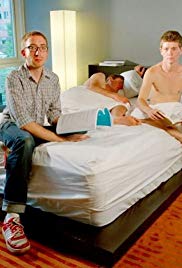
ADULTS IN THE ROOM
US, 2010, 85 minutes, Colour.
Brian Findlay, Calvin Mc Carthy.
Directed by Andrew Blubough.
This is a small-budget independent film made in Portland, Oregon, with the help of local companies and kickstart donations.
The theme of the film is a sexual relationship, a sexual relationship, between an adult and a 16-year-old still at school.
We are introduced to the narrative first, the boy at school, his ability to write, the support of his teacher, his going out of the school, getting into the car with his friend, at home with him, the sexual encounter. The 16-year-old seems to be fully conscious of what he is doing and his consent. The adult is exploitative but accepts the situation and the attitude of the student.
We then see that this is a film being made, based on the experience of the film director. So, there is documentary material about the casting and making of the film along with the continued sequences developing the narrative. The director indicates that the story was part of his own experience at school – and that he is trying to contact the adult to get his consent about the making of the film but failing to make contact.
With the documentary material, the director welcomes a range of students to a working class on film-making, checking the film is that they have been seen recently (it is the period of The Hangover and of Up). The students are young but interested in the process. The director also discusses, sometimes at some length, his story, his questioning, a touch of scruple, with a range of adults, some real, who give him an opinion about the unsuitability of the relationship, a young woman certainly against the possibility of a man under eighteen mature enough to give consent, others looking at the aspects of the law as well as morality.
Punctuating the action is the reporting of a local court case, the accusations against the local mayor, a newspaper journalist exposing a story that he had a similar relationship with a minor in his past, both denying it at first, but, eventually, the young man admitting to the truth. The mayor goes into the court, has some local support because of his achievement in office, but also protest against his moral behaviour. There are television reports, scenes from the court, statements from the mayor himself and others in the court.
There is a complication for the boy concerned, the death of his mother, his father not understanding him, going out with a girlfriend with the prospect of marrying her and the boy not liking her at all.
There is also the complication that the older man seems to be a serial offender, picking up boys, taking them to expensive restaurants for dinner, getting their gratitude, continuing the liaison though saying that it could be broken off.
There is a crisis in the narrative when the boy completes writing his story, a description of his admiration for the man, the teacher reading it and realising what is happening and challenging the boy. The boy wants the man to read his story who puts him off when he phones, doesn’t turn up to a meeting. The boy then hangs out with friends, with his classmates, a boy and a girl, wait and eventually there is a confrontation.
While the film is fairly basic, given its budget, it is an interesting opportunity to reflect on aspects of the sexual relationship between an older man and a minor.